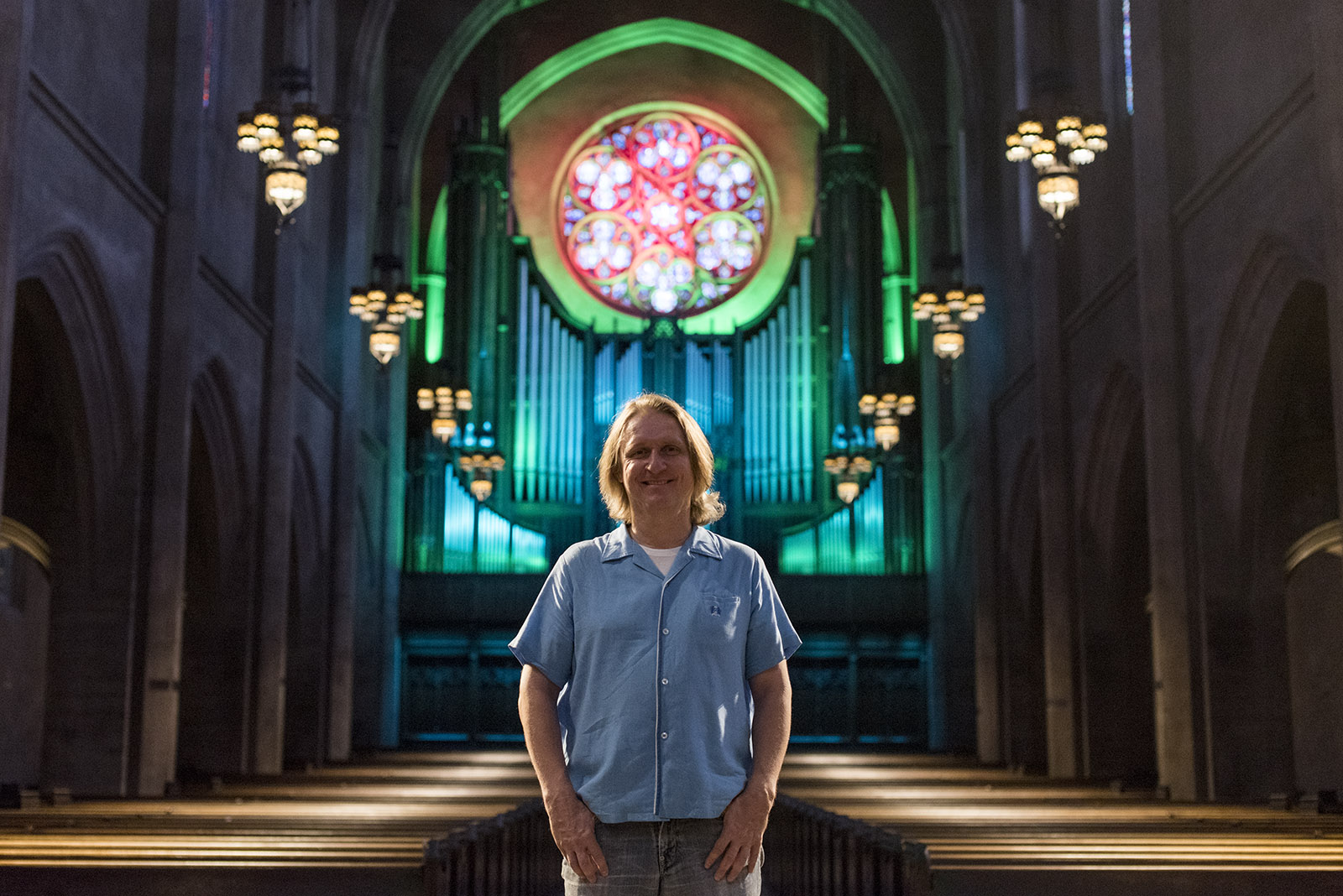Q&A: Christoph Bull discusses his musical contribution to ‘Ghostbusters’

UCLA adjunct associate organ professor Christoph Bull recorded his music for the “Ghostbusters” movie score at the First Congregational Church of Los Angeles. The church was lit blue and green for two days in May to evoke a “Ghostbusters” ambiance. (Miriam Bribiesca/Photo editor)
By Ruhee Patel
July 31, 2016 11:49 p.m.
Christoph Bull brought the “Ghostbusters” soundtrack to life on his neighborhood church organ.
Bull, an adjunct associate organ professor in the UCLA Herb Alpert School of Music, recorded the organ music for the new “Ghostbusters” movie score at the First Congregational Church of Los Angeles over the course of two days in May.
Film composer Theodore Shapiro sought Bull out for the project because Shapiro recognized him as a versatile organist, Bull said. Bull’s background as an organist includes international concert performances and church accompaniment gigs. This was the first time his music hit the silver screen in a major motion picture.
The organ blends with the strings and brass of the film’s orchestra to help create a score that varies from ominous to soothing. The First Congregational Church’s organ was perfect for a movie, he said, since the instrument’s extensive pipes provide a natural source of surround sound.
The Daily Bruin’s Ruhee Patel spoke with Bull about bringing his instrument to life onscreen, using organ music in film scores and how recording compares to live performance.

Daily Bruin: What drew you to this project?
Christoph Bull: That was an easy decision – it’s a nice opportunity to play for a major motion picture. Also, the creative part was really attractive. Most of my professional life is in performing live, but I really like the art of recording. I think one of the reasons I like it is because you have something to hold on to.
Live is great, but it’s very transitory. It happens and then it’s gone, which is cool in its own way … but I also like the process of trying different things. When recording you can redo a take and say, … “Let’s detach the note a little bit more,” or “Let’s use a different sound.”
DB: What was the actual recording process like?
CB: One of the interesting things about playing the organ in general is that we use all of our limbs. We have to process a lot of information. During the recording, I’m looking at written music, playing with my hands and also sometimes having to change sound. In this particular case, I’m also listening to a tempo track that I have to follow. There’s a lot of things to think about at once and that’s a big part of the process.
We also lit the church in a certain way with some green and blue colors to make it look “Ghostbusters” themed. It wasn’t needed for the film because we only recorded – we didn’t film – at the church, but we still made sure we had that atmosphere.
DB: What place does organ music have in film scores?
CB: It’s not that common, especially not the way we did it, which is the right way. We did it where we went to a church with a great organ and went to great lengths to record it. Sometimes I hear organ in movies and it’s kind of a synthesizer sound. That disappoints me because I know it can sound a lot more authentic than that. I think it might be more popular now because the movie “Interstellar” also used the organ in a prominent way. I think people heard that and were like, “Wow, you can do a lot with the organ.”
DB: How does the experience of being a church organist compare to recording for a film score?
CB: Being a church organist helps me be a concert organist because, even though it’s in a church, it’s still a performance. Some of the rules of performance apply in that you really want to involve people and grab them and touch them emotionally. That’s true for recording, too. In a way, they all have that element of performance.
The live performance is a little different in that a mistake could be OK, whereas in a recording, you don’t want any mistakes because they would live forever. There’s a very high level of perfectionism in recording. The church (performance) I would compare more to a theatrical performance – it’s right then and there in the moment. The recording is more like making a movie. You do it over and over until it’s just right.


